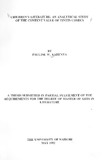| dc.description.abstract | This study analyses the values contained in the Tintin comics as they relate to the
Kenyan children who read these comics. The actual and potential effects of the comics
on the values and value systems of the children is discussed.
It is noted that comics are a unique type of literature based primarily, as they are, on
the picture. This aspect of comics makes them appealing to the children. Hand in hand
with the pictures goes the subject of colour. The Tintin comics are lavishly colourful.
These bright colours beckon the children and give the comics extra appeal. Combined
with the features of humour and entertainment, the foregoing factors give these comics
unique potency as a medium of communicating to children.
As this is a study of values, it has been found necessary to have recourse to the concepts
of theme and socialization. These concepts and their applicability to the study are
expounded in the introductory chapter. Herge, the author of the Tintin comics is seen
as assuming a certain socially conditioned stance towards the values discussed and as
making a deliberate effort to affect the children so that they adopt a similar stance.
The Tintin comics as adventure stories is the subject of chapter two of the thesis. In
discussing adventure, the role of the hero has been taken as a central factor. The terms
adventure and hero are defined generally as they relate to the individual and social
values. The hero as an embodiment and vehicle of social values is seen as a role model.
The intended and actual perception of that role by the children in the case of the hero
of the Tintin comics is analysed and the reaction of the children to it discussed.
As the author of the comics equates adventure with violence, the subject of violence is
dealt with alongside adventure. Other themes such as corruption, drug trafficking and
drug abuse are also dealt with in this chapter.
Racism is a running theme in the Tintin comics. It is the subject of chapter three of this
thesis. The term is defined and the manifestation of racism and racist ideas in these
comics is traced and analysed. The deliberate and concerted effort of Herge to impart
racist values in the children and the purposes are discussed. It was also necessary to
look at how the children perceive this subject in the texts and the effects which that
perception has on the children.
Overall, the study has looked at both sides of the coin as far as the values and the
effects and possible effects of the comics on their young readership is concerned. As the
study does not encompass all aspects related to the subject of comics and the
socialization of children, w,e view it as an attempt to break ground in this important area
of children's literature. | en |

